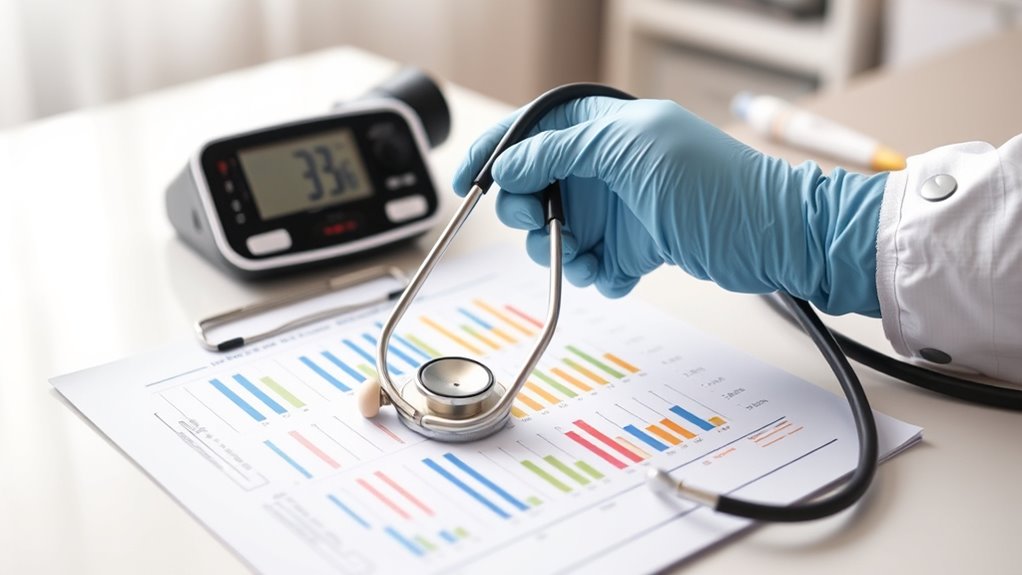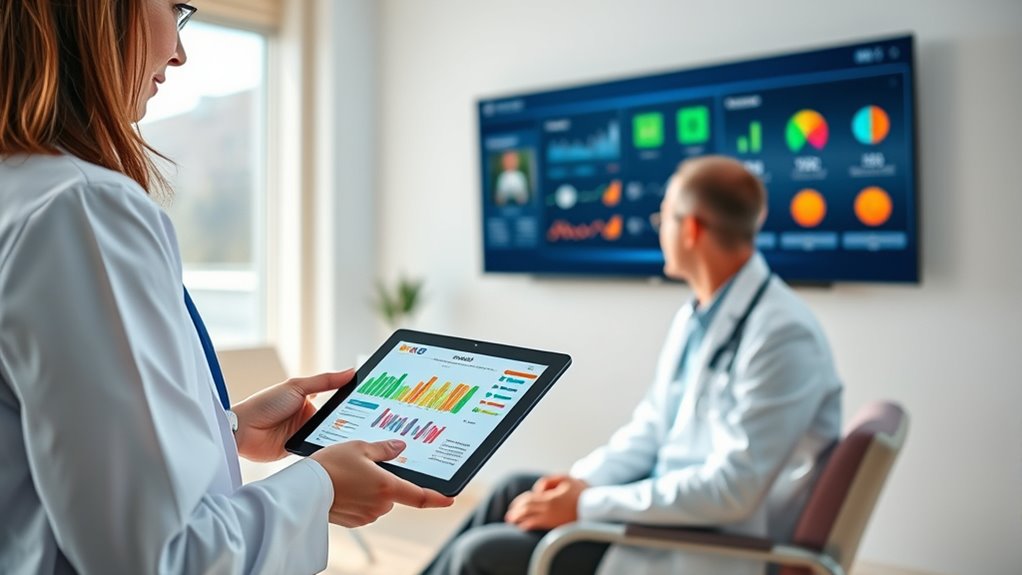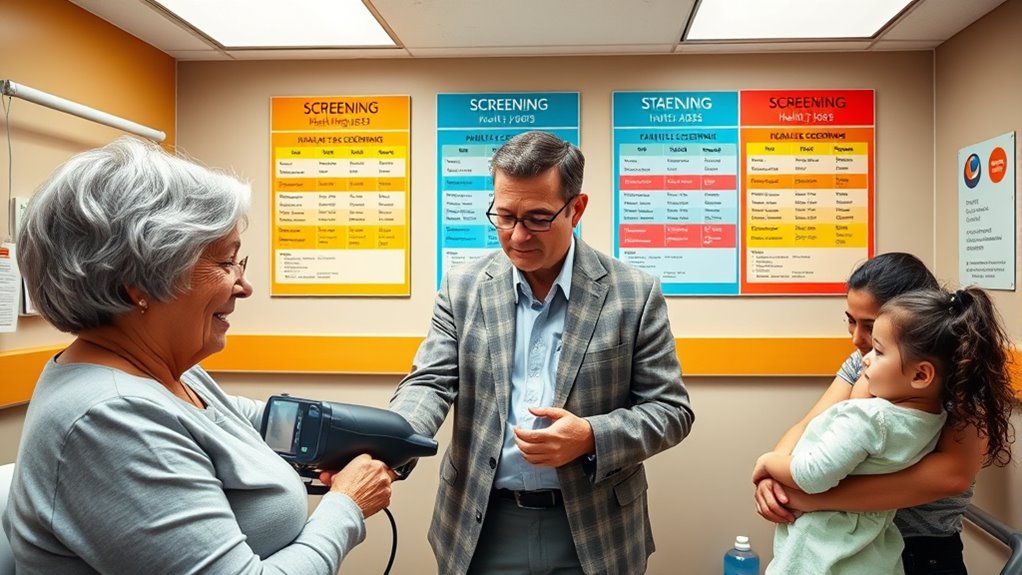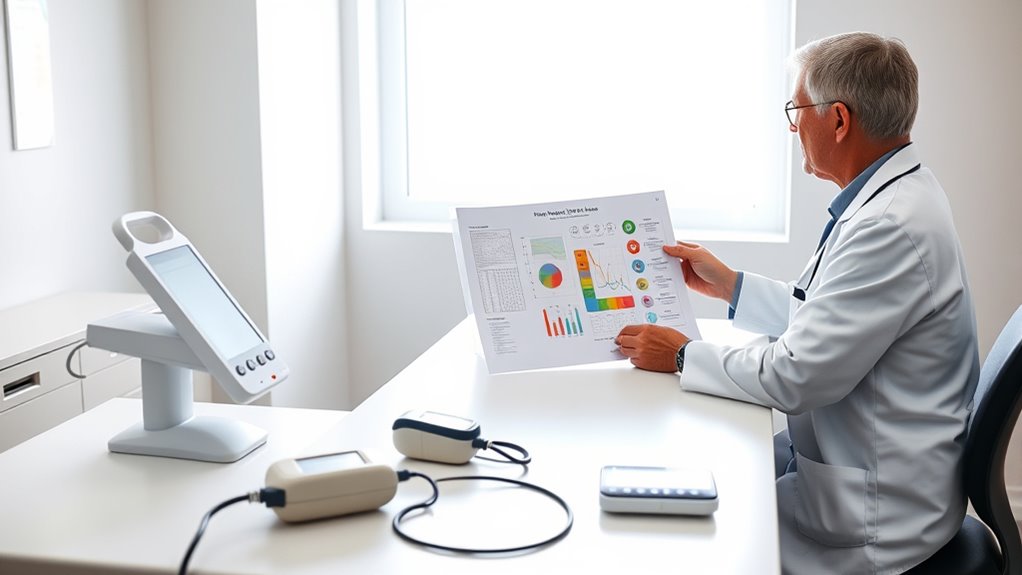Regular health screenings are essential because they help you catch health issues early before symptoms appear, enabling timely treatment and preventing serious conditions. They uncover risk factors like genetic predispositions, nutritional deficiencies, and lifestyle concerns that might otherwise go unnoticed. By staying proactive with routine checks, you save money, reduce the need for invasive procedures, and improve your chances of staying healthy long-term. Keep exploring to discover how to make these checkups a seamless part of your life.
Key Takeaways
- Early detection of health issues allows timely intervention and improves treatment success rates.
- Regular screenings identify risk factors before symptoms appear, enabling proactive prevention strategies.
- They help manage chronic conditions effectively, reducing complications and invasive treatments later.
- Routine checks are cost-effective by preventing expensive treatments through early diagnosis.
- Consistent screenings promote long-term health, supporting a healthier lifestyle and reducing future healthcare costs.
The Role of Screenings in Preventive Healthcare

Screenings play a crucial role in preventive healthcare by detecting health issues early, often before symptoms appear. Genetic testing helps identify inherited risks for conditions like diabetes or heart disease, allowing you to take proactive steps. Nutritional assessments evaluate your diet and nutrient levels, revealing deficiencies or imbalances that could lead to health problems down the line. These screenings provide valuable insights into your overall health, guiding personalized prevention strategies. By catching potential issues early, you can implement lifestyle changes, seek appropriate treatments, and reduce the risk of serious illnesses. Regular screening ensures you stay informed about your health status, empowering you to make informed decisions and maintain long-term wellness. Incorporating preventive health measures into your routine can significantly improve your quality of life.
Common Types of Routine Health Checks

Regular health checks are essential for maintaining your overall well-being, as they help identify potential issues before they develop into serious problems. One common check is measuring your blood pressure to detect hypertension, which can lead to heart disease if left unchecked. You’ll also have your cholesterol levels tested to assess your risk for cardiovascular conditions. These tests are quick, non-invasive, and provide critical information about your heart health. Depending on your age, lifestyle, and family history, your healthcare provider may recommend additional screenings, like blood sugar tests or BMI measurements. Regularly monitoring these key indicators allows you to make informed decisions about your health and take action early, reducing the likelihood of developing more severe health problems later on. Digital literacy can also play a role in managing your health, as many tools and apps now assist in tracking and understanding your health data.
How Early Detection Saves Lives

When you catch health issues early, you give yourself a better chance to treat them effectively. Early detection can prevent minor problems from turning into serious, life-threatening conditions. By staying proactive, you’re taking control of your health and potentially saving your life. Additionally, being aware of symptoms such as a lump or changes in breast appearance can lead to early diagnosis, which significantly improves treatment success rates.
Detects Diseases Early
Detecting diseases early can considerably improve your chances of successful treatment and recovery. Regular health screenings help identify conditions before symptoms appear, especially if you have genetic predispositions. Early detection allows you to take proactive steps, such as lifestyle modifications, that can slow or prevent disease progression. For example, catching high blood pressure or high cholesterol early gives you the opportunity to make dietary changes and increase physical activity. These early interventions can prevent severe complications later on. By staying vigilant with screenings, you’re empowered to address health issues promptly, ultimately saving your life. Recognizing problems early is a critical step in maintaining long-term health and avoiding more invasive or expensive treatments down the line. Additionally, understanding the importance of anime culture and storytelling can motivate people to stay healthy and active so they can enjoy their favorite films and hobbies well into the future.
Enhances Treatment Effectiveness
Early detection of health issues not only improves your chances of successful treatment but also considerably enhances how effectively those treatments work. When you undergo genetic testing early, you gain insights into your predispositions, allowing your healthcare provider to tailor treatments specifically for you. This personalized approach increases the likelihood of success. Additionally, early diagnosis enables you to implement lifestyle modifications that can prevent disease progression or reduce symptoms, making treatments more effective. For instance, recognizing risk factors early can lead to dietary changes, exercise routines, or medication adjustments that optimize health outcomes. Recognizing narcissistic traits early can also help in managing relationships and emotional well-being more effectively. Overall, catching health problems early empowers you to take proactive steps, ensuring treatments are more targeted, efficient, and ultimately, more successful in saving lives.
Identifying Risk Factors Before Symptoms Appear

Identifying risk factors before symptoms appear allows you to take proactive steps to protect your health. Recognizing your genetic predispositions and lifestyle factors helps you address potential issues early. Here are three ways to do this:
- Get genetic testing to uncover inherited risks for conditions like heart disease or diabetes.
- Assess lifestyle factors such as diet, exercise, and smoking habits that influence your health.
- Schedule screenings based on your family history and personal risk profile, even if you feel fine.
- Consider participating in community health events like hackathons focused on health innovation to learn about new screening technologies and preventive strategies.
Cost-Effectiveness of Regular Screenings

Regular health screenings can save you money by catching issues early before they require expensive treatments. When problems are identified early, you avoid costly procedures down the line. Over time, these proactive steps help reduce your long-term healthcare expenses. Additionally, scheduling screenings regularly can ensure early detection of health issues, improving treatment outcomes and further lowering costs.
Prevents Costly Treatments
By catching health issues before they become severe, regular screenings save you money in the long run. Detecting genetic predispositions early allows you to take preventive steps, reducing the risk of costly treatments later. Additionally, screenings highlight areas where lifestyle modifications can make a difference, preventing future complications. Consider these benefits: 1. Identifies risk factors early, minimizing expensive interventions. 2. Encourages proactive lifestyle changes, lowering treatment costs. 3. Detects conditions in manageable stages, avoiding advanced, costly procedures. Incorporating preventive care strategies such as regular health screenings can further enhance your overall health management and cost savings.
Early Detection Saves Money
Early detection through screenings proves to be a cost-effective strategy for maintaining your health. Advances like molecular diagnostics enable early identification of diseases at a cellular level, often before symptoms appear. This means you can address health issues sooner, reducing the need for extensive and expensive treatments later. Additionally, genetic counseling helps you understand your inherited risks, guiding personalized screening plans that catch problems early. By investing in regular health screenings, you avoid costly emergency interventions and complex procedures down the line. The combination of cutting-edge technologies and proactive checkups makes early detection a smart financial choice. Furthermore, engaging with the community of health-conscious individuals who prioritize regular screenings can reinforce positive habits and provide valuable support. Overall, staying vigilant with scheduled screenings not only safeguards your well-being but also saves you money by preventing advanced health complications.
Reduces Long-Term Expenses
Investing in routine health screenings can substantially lower your long-term healthcare costs. Regular checkups help identify issues early, enabling you to make lifestyle modifications that prevent costly complications. For example: 1. Detecting risk factors early allows you to adopt healthier habits sooner. 2. Genetic testing reveals predispositions, so you can target preventive measures specifically for your needs. 3. Managing health proactively reduces the need for expensive treatments later on. By catching problems early, you avoid the financial burden of advanced illnesses. These screenings empower you to take control of your health, making smarter decisions that save money in the long run. Plus, addressing risks early often results in better health outcomes, further lowering costs over time. Ultimately, regular screenings are a smart investment in your financial and physical well-being. Incorporating modern toilet technology can also contribute to better hygiene and health management.
Recommended Screening Schedules for Different Age Groups

Regular health screenings are essential at every age to detect potential issues early and maintain overall well-being. For children and teenagers, routine checkups often include immunizations, growth assessments, and screenings for vision and hearing. As you reach your 20s and 30s, screenings like blood pressure, cholesterol, and lifestyle assessments become important. Genetic screening may be considered based on family history, helping identify risks early. In your 40s and 50s, schedule regular mammograms, colonoscopies, and bone density tests, adjusting frequency as needed. For those over 60, screenings focus on age-related conditions, such as glaucoma or osteoporosis. Staying proactive guarantees you catch health concerns early and tailor your screening schedule to your age and personal risk factors.
The Impact of Screenings on Managing Chronic Conditions

Screenings play a vital role in managing chronic conditions by detecting issues before they worsen. They help you identify genetic predispositions early, enabling proactive measures. Regular screenings also guide effective lifestyle modifications, reducing complications. Consider these key impacts:
- Early detection of genetic risks, allowing you to implement preventive strategies.
- Monitoring disease progression to adjust treatments promptly.
- Personalized advice on lifestyle changes, like diet and exercise, to control symptoms.
Overcoming Barriers to Regular Health Assessments

While understanding the benefits of health assessments is important, many people face obstacles that prevent them from staying consistent. Insurance coverage often plays a significant role; if your plan doesn’t cover screenings or involves high costs, you might skip appointments. Cultural beliefs can also influence your decisions, as some communities may view certain tests as unnecessary or invasive. To overcome these barriers, start by researching your insurance options and seeking clinics that offer affordable or free screenings. Educate yourself about the importance of regular assessments, regardless of cultural perspectives. Talk openly with healthcare providers about your concerns and ask about available resources. Taking these steps can help you prioritize your health and make regular screenings a more achievable part of your routine.
Tips for Staying Consistent With Your Screening Routine

Staying consistent with your screening routine requires deliberate planning and commitment. To make it easier, consider these tips:
Consistency in screenings needs planning—schedule, reminders, and tracking to stay motivated and on track.
- Schedule screenings alongside your regular healthcare appointments to create a routine.
- Set reminders on your phone or calendar to alert you beforehand, helping you prioritize mental health and lifestyle habits.
- Keep a health journal to track screenings and note any changes in your well-being, reinforcing your motivation.
Frequently Asked Questions
How Do I Choose the Right Screenings for My Lifestyle?
When choosing the right screenings for your lifestyle, start by evaluating your personal risk factors like family history, age, and lifestyle habits. Then, review screening guidelines from trusted health organizations to see what’s recommended based on your profile. Talk to your healthcare provider to customize a screening plan that fits your needs, ensuring you catch potential health issues early and stay proactive about your well-being.
Are There Any Risks Associated With Routine Health Screenings?
Think of health screenings like a GPS—they guide you, but sometimes they lead to detours. While routine screenings are generally safe, there are risks like overdiagnosis concerns, which can cause unnecessary anxiety or treatments. Screening accuracy varies, so it’s essential to discuss potential risks with your doctor. Overall, the benefits often outweigh the risks, helping you catch issues early and stay on the right health path.
How Often Should I Update My Screening Schedule?
You should update your screening schedule based on your age, health history, and lifestyle. Typically, the screening frequency varies for different tests, so it’s best to consult with your healthcare provider to create a personalized schedule. Regular check-ins guarantee you’re not missing vital screenings and help catch potential issues early. Keep track of your health changes and adjust your screening routine accordingly to stay proactive about your well-being.
Can Screenings Help Prevent Diseases, or Just Detect Them?
Imagine a person who regularly gets blood pressure checks and catches hypertension early. Screenings serve as preventive measures, helping you identify risks before symptoms appear. While they primarily focus on early detection, they can also prevent disease progression by enabling timely interventions. Regular screenings are essential to maintaining your health, as they allow you to take proactive steps rather than waiting until issues become severe.
What Are the Latest Advancements in Health Screening Technology?
You’re curious about the latest advancements in health screening technology. Today, genetic testing has become more precise, helping identify risks early. Wearable devices now monitor essential signs continuously, providing real-time data to catch issues sooner. These innovations empower you to take proactive steps for your health, making screenings more accessible and effective. Staying updated on these technologies can help you better understand your health and potentially prevent future problems.
Conclusion
Staying on top of regular health screenings can truly save your life. Did you know that early detection of cancer through screenings increases survival rates by up to 90%? By scheduling routine checkups, you’re taking control of your health and catching potential issues before they become serious. Make screenings a priority—your future self will thank you for it. Stay proactive, stay healthy, and enjoy peace of mind knowing you’re doing all you can to protect your well-being.









